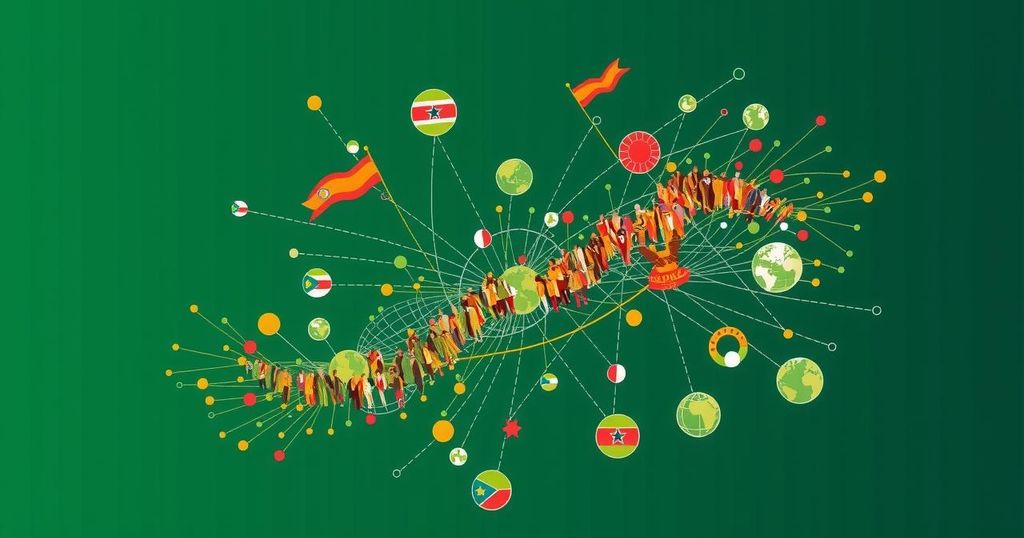Botswana’s Political Shift: The UDC Triumphs Over the BDP

In a historic electoral shift, Botswana’s ruling Botswana Democratic Party (BDP) was ousted by the Umbrella for Democratic Change (UDC), resulting in Duma Boko’s leadership. The defeat stemmed from widespread discontent over economic issues, particularly rising unemployment, healthcare access, and a lack of diversification away from reliance on diamond exports. President Masisi acknowledged the party’s failures, signaling a significant moment for Botswana’s democratic landscape as the UDC seeks to implement a more responsive governance model.
In a groundbreaking political transformation, Botswana’s long-standing ruling party, the Botswana Democratic Party (BDP), was ousted from power during recent elections, paving the way for the Umbrella for Democratic Change (UDC) and its presidential candidate, Duma Boko. This electoral upheaval not only marks a critical milestone in Botswana’s democratic evolution but also raises concerns regarding the nation’s future, particularly as it grapples with economic challenges and seeks diversification beyond its dependence on mineral wealth. For over five decades, since gaining independence from Britain in 1966, the BDP had maintained its grip on power, with minimal changes to its leadership. However, the population’s growing disenchantment with the status quo became evident during the elections, as the UDC, an alliance of opposition parties, secured a decisive victory by winning 28 out of 61 parliamentary seats, breaking the BDP’s historical dominance. The BDP’s defeat is attributed to a multitude of factors, with the sharp decline in global diamond demand being a significant catalyst. As the second-largest natural diamond producer globally, Botswana’s economy has faced severe repercussions from plummeting prices and reduced sales. With diamonds representing over 80 percent of the nation’s exports and constituting a quarter of its GDP, the resultant economic slowdown has contributed to skyrocketing unemployment rates, which have exceeded 27 percent, especially among the youth. During his election campaign, President Mokgweetsi Masisi acknowledged the necessity for policy shifts yet failed to convince voters of his party’s capability to navigate the economic crisis. Discontent was palpable as citizens expressed their frustrations regarding inadequate governmental responses to critical issues, including unemployment, healthcare accessibility, and low minimum wages. Many individuals reported difficulties in affording basic necessities amid rising prices for food and rent, while local entrepreneurs faced challenges in securing timely payments from the government. Duma Boko, a seasoned lawyer and former Leader of the Opposition, effectively harnessed public dissatisfaction to present the UDC as a party of change. With a clear promise to diversify Botswana’s economy, he emphasized priorities such as job creation, educational investment, and healthcare reform. The challenges posed by the current economic crisis galvanized support for the UDC, exemplified through Boko’s campaign slogan, “Botswana First”. In light of the election results, President Masisi publicly recognized his administration’s shortcomings, stating, “We got it wrong big time in the eyes of the people. We were really convinced of our message. But every indication…is that there’s no way that I can pretend that we’re going to form a government. I will step aside.” While some experts argue that not all blame should fall on the BDP, the prevailing sentiment remains that the party failed to deliver on its promises, as the UDC presented a more compelling vision focused on improving citizens’ livelihoods and addressing the pressing issue of youth unemployment.
The recent political shift in Botswana marks a pivotal moment in the country’s democratic journey, ending the Botswana Democratic Party’s (BDP) long-standing dominance since independence in 1966. With the electoral success of the Umbrella for Democratic Change (UDC), Botswana is now confronted with significant economic challenges that necessitate a shift away from reliance on its mineral wealth. The BDP’s inability to address rising unemployment, particularly among the youth, and economic diversification has contributed to widespread disillusionment among the populace, setting the stage for the emergence of a coalition aimed at implementing substantial policy changes.
The conclusion of this election cycle highlights a critical turning point for Botswana, as the UDC aims to address pressing economic challenges and implement a comprehensive reform agenda. The evident desire for change among the electorate underscores the need for political parties to prioritize the will of the people. As the BDP reflects on its defeat, the new leadership must navigate the complexities of governance while focusing on job creation, healthcare access, and educational reform to fulfill the aspirations of the citizens.
Original Source: www.theeastafrican.co.ke







